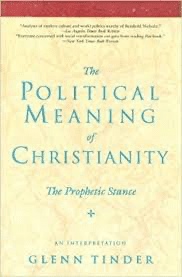The Meaning of Christianity: Liberty and Tolerance
Under discussion here are two small portions of The Meaning of Christianity (by Glenn Tinder) in Chapter Three. They are “Liberty and Community” and “Tolerance” (pp. 116-133).
In a nutshell, Tinder argues, surprisingly perhaps (to some) that true Christianity, as opposed to much historical, empirical “Christianity,” promotes liberty and tolerance.
Tinder explicitly distinguishes between much historical Christianity and true Christianity, as I have here. People who cannot think abstractly will necessarily struggle with me and Tinder.
In the section entitled “Liberty and Community” Tinder argues that “Liberty is the possibility of entering with others into the search for truth” (122) and that true community is the search, together, for truth. “We are treated as human beings only when we are invited to inquire with others into the meaning of our lives. But this can happen only when there is liberty.” (122)
According to Tinder, and I agree with him, “The Church symbolizes the communal character of Christianity.” Because it is based on agape love, “It is an association for conversing…with and about God. And such conversation depends on liberty. Although the church has sometimes been hierarchical and oppressive, it enacts its destiny only by calling its members to what Paul termed ‘the glorious liberty of the children of God’.” (124)
Tinder then segues into a discussion of “Tolerance.” (125) That because he knows and acknowledges that many readers will have trouble reconciling what he has said about Christianity and liberty with a common “picture” of Christianity as intolerant and oppressive.
In these pages, 125-133, Tinder argues that “Tolerance is the fullest expression of the [Christian] prophetic stance” for which he has been arguing throughout the book so far (and beyond). (131) “In sum, the only truths we possess are truths we possess through words, and words are vulnerable to the fallibility that necessitates tolerance. On the other hand, the one truth [Jesus Christ] that is invulnerable to our fallibility is the truth we not possess (it possesses us) and cannot force others to profess.” (129)
Tinder does not reject doctrines; he rejects coercing belief in doctrines. Tinder does not reject answers; he rejects rejecting questions. These two sentences sum up these sections. And why? On what grounds does Tinder make these affirmations? It all goes back to the first chapter and the emphasis on agape love. Agape is violated by rejecting questions, dialogue, and by coercion of belief.
May I dare to say that the Anabaptist tradition, in its pure form, stemming form the founders, men like Menno Simons and Balthasar Hubmaier, says the same as Tinder here? Especially with regard to tolerance of belief, non-coercion of “faith.”
But that, about the Anabaptist tradition, is not the main point here. The main point here is that far, far too much of empirical Christianity past and present has failed to live up to the prophetic stance Tinder expounds. Questions are rejected; belief is coerced.
None of that means that Christian organizations cannot have boundaries. But Christianity itself is not a bounded set but a centered set (as I have argued here many times). The center is Jesus Christ. But empirical churches and Christian organizations can and must have boundaries, however flexible. Even within those boundaries, however, agape love requires that honest questions not be met with hostility (as they were in the denomination in which I grew up). And agape love requires that coercion not be used to enforce conformity (as it was in the denomination in which I grew up).
*Note: If you choose to comment, make sure you have read the pages of The Meaning of Christianity under discussion here. If not, you may ask a question. In any case, make sure your comment or question is relatively brief (no more than 100 words), on topic, addressed to me, civil and respectful (not hostile or argumentative), and devoid of pictures or links.*














